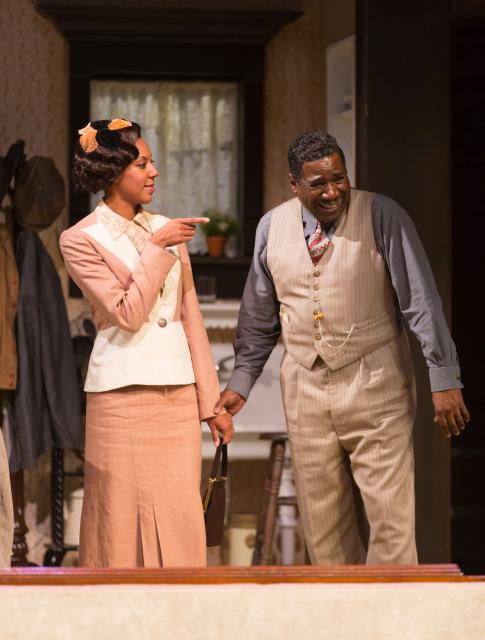
August Wilson (1945-2005), in the “Pittsburgh Cycle,” created ten plays set in the decades from the 1900s to 1990s. Two of the dramas that chronicle generations defined by the Great Migration of African Americans from the rural, agricultural south to the industrial north, earned Pulitzer Prizes. Not in chronological order, the plays started with Jitney (the 1970s) in 1982 and ended with the 1990s and Radio Golf in 2005. He died between its premier and Broadway opening in 2007. Through November 10, 2016, the Hartford Stage Company is presenting The Piano Lesson, which premiered just up the street so to speak at Yale Rep in 1987. It won the Pulitzer Prize for drama. The handsomely carved piano, a treasured heirloom and repository of family history in elegant relief profiles of ancestors, has been borrowed from Yale for the Hartford production. The eponymous musical instrument is the fulcrum for dramatic tension between siblings. In the wee hours of the morning the raucous, down-home hustler, Boy Willie (Clifton Duncan), and his soft-spoken partner in crime, Lymon (Galen Ryan Kane), barge into the home of his uncle Doaker (Roscoe Orman). They demand drinks to celebrate an unannounced homecoming.
With a load of watermelons to sell, they have driven north in a broken down, and perhaps stolen truck. In addition to money from the melons, Willie is intent on selling the piano in which he has a half interest. His plan is to buy a sweet plot of land to farm. Descending the staircase in a nightgown and robe, Berniece (Cristina Acosta Robinson) is not thrilled to see her brother. It's been three years since her husband was gunned down because of one of his scams to steal a load of wood. His ghost haunts the house, and she is too spooked to play the piano. There is, however, no way that she will consent to part with it. The piano is a signifier of her DNA. Arguably, that is the stripped-down essence of the play, but Wilson has cast a wider and more complex net. While the primary conflict focuses on brother and sister, there are six other characters and their back stories to sort out. All of this is set against the decade of The Great Depression. There are vignettes of those struggling to hang on and survive and ignorant country boys with wild schemes. From banter, we surmise that Willie and Lymon have done time and worked on Mississippi's infamous Parkman Farm. There are references to Southern justice that are largely lost on white audiences. Through a complicated bribe to get out of jail, Lymon is bound to pay back by working for free. An aspect of Wilson's mandate was to create ambitious plays that evoke classical paradigms but set to the vernacular patois of black culture. During the long and winding unfolding of the drama (two ninety minute acts) the audience often struggles to catch the drift of unfamiliar dialects. Under the direction of Jade King Carroll there are broad dynamic swings for the diverse but sharply defined characters. The powerful, charismatic but unrestrained performance of Clifton Duncan as Boy Willie overwhelms nuances of the other actors. His energy level is set so high that it provides jarring contrast with more muted and subtle performances of several of the other players. Compared to the over-the-top Boy Willie, the understated restraint of Berniece by Cristina Acosta Robinson commands riveted attention through her meticulous, deliberately sotto voce delivery. The siblings are truly a study in contrast, and it is immediately evident who will prevail in the end. It is a matter of her cool-headed response to his raging-bull intensity. As Doaker (Roscoe Orman) delivers a masterful performance. He exemplifies the focused, hard-working migrant who earns an honest living working on the railroad. There is an astonishing moment when he bemusedly plays choo-choo while ironing his pants. At times his lines are delivered in a faltering, self conscious manner, but we come to appreciate that as an aspect of a brilliant and complex performance. Thematically, Wilson focuses on how some migrants adapt and prosper while others do not. A leitmotif is the shy and naive Lymon. For reasons that involve the sheriff, he plans to stay. From his share of watermelon money, he is talked into buying a pimp suit and slick kicks by the musician Wining Boy (Cleavant Derricks). When the drama tends to drag, the energy and humor of Derricks provides a much needed lift. Rolling the bones, this sporting life character is flush one day and broke the next. His theme is luck be a lady tonight. We are amused by the transformation as the country boys set off into the night to be cheated out of their earnings in pursuit of fast women. Faced with a dizzy conflation of plots and subplots, we are at times adrift in dialogue. That tough slogging is punctuated with astonishingly energizing intervals of music. These range from a cappella work songs to romping boogie woogie on the ivories. The audience perked up and applauded the musical interludes. The enigma and tragic poignancy of the drama is conveyed by the melancholy of Berniece. Haunted by his ghost she still mourns for her husband. She is not ready for the proposal of the preacher man Avery (Daniel Morgan Shelley). There is a superb moment when, at least for now, she spurns his attention. In a surprising twist this virtuous woman momentarily responds to Lymon before recovering her senses. On a thrust stage in the intimate theater, Alexis Distler has designed a detailed, realistic set. It provides the authentic ambiance of the period with a lot of space for actors to navigate. The lighting of York Kennedy provides a powerful wallop during the surprise ending. While Wilson packed a lot of genre and history into this drama, a bit of pruning would make it more palatable for the audience. This production has opted to tread lightly in reworking an iconic masterpiece.
